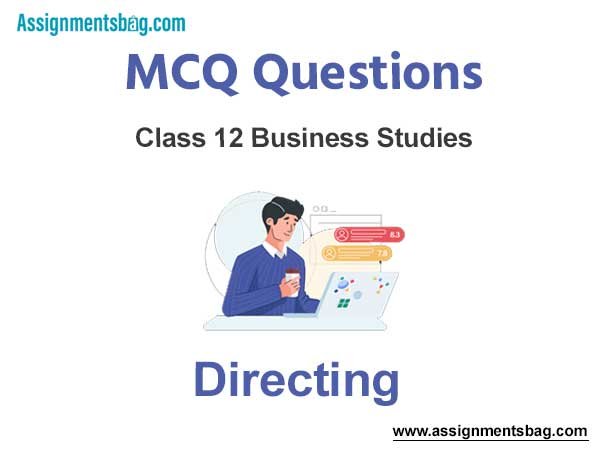Please refer to MCQ Questions Chapter 7 Directing Class 12 Business Studies with answers provided below. These multiple-choice questions have been developed based on the latest NCERT book for class 12 Business Studies issued for the current academic year. We have provided MCQ Questions for Class 12 Business Studies for all chapters on our website. Students should learn the objective based questions for Chapter 7 Directing in Class 12 Business Studies provided below to get more marks in exams.
Chapter 7 Directing MCQ Questions
Please refer to the following Chapter 7 Directing MCQ Questions Class 12 Business Studies with solutions for all important topics in the chapter.
Question. No interference of superior in taking decision by subordinates in
(a) Autocratic leadership
(b) Democratic leadership
(c) Free rein leadership
(d) Paternalistic leadership
Answer
C
Question. Which of the following is not an element of directing?
(a) Supervision
(b) Staffing
(c) Motivation
(d) Leadership
Answer
B
Question. The need that is concerned with sense of belongingness
(a) Esteem need
(b) Self Actualisation need
(c) Security need
(d) Affiliation need
Answer
D
Question. Which is not an element of leadership
(a) It is the process of influence
(b) The influence is always for common goal
(c) It influence your own behavior
(d) It influence employee willingly
Answer
C
Question. Which of the following is a non-financial incentive?
(a) Job security
(b) Retirement Benefit
(c) Bonus
(d) Co-partnership
Answer
A
Question. Jagan, who was working in a big company resigned on the ground of ‘lack of recognition and attention’ in the organization towards his work and performance. Identify the hierarchy need according to Maslow which was not satisfied for Jagan.
(a) Psychological needs
(b) Safety needs
(c) Affiliation needs
(d) Esteem needs
Answer
C
Question. Leadership:
(a) Influencing the behavior of others
(b) Maintain bad interpersonal relationship
(c) Influence employees to involuntarily
(d) Helps in planning
Answer
A
Question. Full utilization of potential and capacity of employees can be seen in
(a) Autocratic leadership
(b) Democratic leadership
(c) Free rein leadership
(d) Paternalistic leadership
Answer
C
Question. Which of the following describes ‘Autocratic Leadership Style’?
(a) Leader develops action plan in consultation with subordinates
(b) Communication is only one way with subordinates
(c) Manager is only to support and provide information
(d) Followers have high degree of independence
Answer
B
Question. Which financial incentive is concerned with regular increments in pay every year?
(a) Bonus
(b) Productivity linked wage incentives
(c) Pay and allowances
(d) Co- Partnership
Answer
C
Question. Which of the following decisions procedure would be characterize by a manager who asks other people for their opinion and ideas, then makes the decision alone
(a) Autocratic
(b) Consultation
(c) Joint decision
(d) Delegation
Answer
B
Question. Which is not the features of leadership
(a) It indicates the ability of individual
(b) It tries to bring change in behavior
(c) It shows interpersonal relationship
(d) It is based on personal goal
Answer
D
Question. Which non-financial incentive has negative aspect?
(a) Status
(b) Career Advancement Opportunity
(c) Job security
(d) Job Enrichment
Answer
C
Question. Obedience of order and discipline is find in
(a) Autocratic leadership
(b) Democratic leadership
(c) Free rein leadership
(d) Paternalistic leadership
Answer
A
Question. The lowest level need in the need hierarchy theory of Abraham Maslow is
(a) Safety need
(b) Belongingness need
(c) Esteem need
(d) Physiological need
Answer
D
Question. The process of converting the message into communication symbols is known as:
(a) Media
(b) Encoding
(c) Feedback
(d) Decoding
Answer
D
Question. Under which of the following decision procedure would other people have the greatest influence
(a) Autocratic
(b) Consultation
(c) Joint decision
(d) Delegation
Answer
A
Question. Which of the following is most accurate regarding the research conducted on participative leadership
(a) Autocratic
(b) Consultation
(c) Joint decision
(d) Delegation
Answer
B
Question. Directing takes place wherever superior- subordinate relations exist. Identify the characteristic highlighted in the above statement-
(a) Directing is a continuous process
(b) Directing flows from top to bottom
(c) Directing takes place at every level
(d) Directing initiates action
Answer
C
Question. Which of the following is a financial incentive?
(a) Job security
(b) Stock option
(c) Job enrichment
(d) Employee participation
Answer
B
Fill in the Blanks :
Question. Spread of rumors is possible in————–communication.
Answer
Informal
Question. In autocratic leadership style only —————communication is done with subordinates.
Answer
one way
Question. —————- acts as an incentive when employees are in service in the organization.
Answer
Retirement Benefits
Question. Converting encoded symbols of the sender is————–.
Answer
Decoding
Question. Mr. Madan Kumar, a senior manager does not allow his subordinates to express their feelings freely to himself. This may result in _________ barrier.
Answer
Organisational
Question. The process of instructing, guiding, counseling, motivating and leading people in the organization is called __________ function of management.
Answer
Directing
Question There are many theories of leadership———and————-.
Answer
behavior, styles
Question. The network of informal communication is known as—————-.
Answer
Grapevine
Question. A manager did not listen to the communication of going late from office as he had already planned movie watching with his family, this resulted in __________ barrier in effective communication.
Answer
Personal
True / False :
Question. Misunderstanding created in communication due to use of technical words is an example of personal barrier
Answer
False
Question. Leadership is most associated with vision.
Answer
True
Question. Issue of notice is an informal way of communication.
Answer
False
Question. Unwillingness of the subordinate to communicate with the superior is an organizational barrier
Answer
False
Question. If there is two way information flow between the superior and subordinate then there will be positive reaction of employees.
Answer
True
Question. Leadership is not a continuous process.
Answer
False
Question. Formal communication may be written or oral.
Answer
True
Question. Motivation can be Positive and it can never be negative.
Answer
False
Question. Lazzise faire is one of the style of leadership.
Answer
True
Question. If jobs are enriched and made interesting, the job itself becomes a source of motivation to the individual.
Answer
True
Question. Ambiguous symbols that lead to faulty encoding is an example of noise.
Answer
True
Question. Follow up measures help in removing obstacles in effective communication.
Answer
True
Match the following :
Question.
| 1. One way communication | a. Autocratic |
| 2. Leader will encourage the subordinates | b. Democratic |
| 3. Resolving issues themselves. | c. Free rein |
Answer
1-a, 2-b, 3-c
Question.
| 1. Dogmatic | a. Participative |
| 2. High degree of independence | b. Autocratic |
| 3. Democratic | c. Free rein |
Answer
1-b, 2-c, 3-a
Question.
| 1. Leadership indicates ability of an individual. | a. In the behavior of other |
| 2. Leadership tries to bring change | b. To influence others |
| 3. Leadership indicates interpersonal relationship | c. Between leaders and followers |
Answer
1-b, 2-a, 3-c
Question.
| 1. Full faith in subordinates | a. Autocratic |
| 2. Cooperative relations | b. Democratic |
| 3. Single man decisions | c. Free rein |
Answer
1-c, 2-b, 3-a
Question.
| 1. when subordinates are uneducated | a. democratic |
| 2. when roles are clear | b. autocratic |
| 3. when employee are highly educated | c. laissez faire |
Answer
1-b, 2-c, 3-a
Question.
| 1. Quick and clear decisions | a. Democratic |
| 2. high morale | b. laissez faire |
| 3. high level motivation | c. autocratic |
Answer
1-c, 2-b, 3-a
Question.
| 1. lack of motivation | a. autocratic |
| 2. delay in decisions | b. free rein |
| 3. difficulty in cooperation | c. democratic |
Answer
1-a, 2-c, 3-b
Question.
| 1. downward communication | a. democratic |
| 2. lack of responsibility in managers | b. autocratic |
| 3. self directed | c. free rein |
Answer
1-b, 2-a, 3-c
Question.
| 1. Centralised authority | a. democratic |
| 2. cooperative relations | b. autocratic |
| 3. self directed |
Answer
1-b, 2-a, 3-c
Question.
| 1. Satisfactory work | a. democratic |
| 2. creation of more efficiency and productivity | b. free rein |
| 3. helpful in development and extension of the enterprise | c. autocratic |
Answer
1-c, 2-a, 3-b

We hope you liked the above provided MCQ Questions Chapter 7 Directing Class 12 Business Studies with solutions. If you have any questions please ask us in the comments box below.

